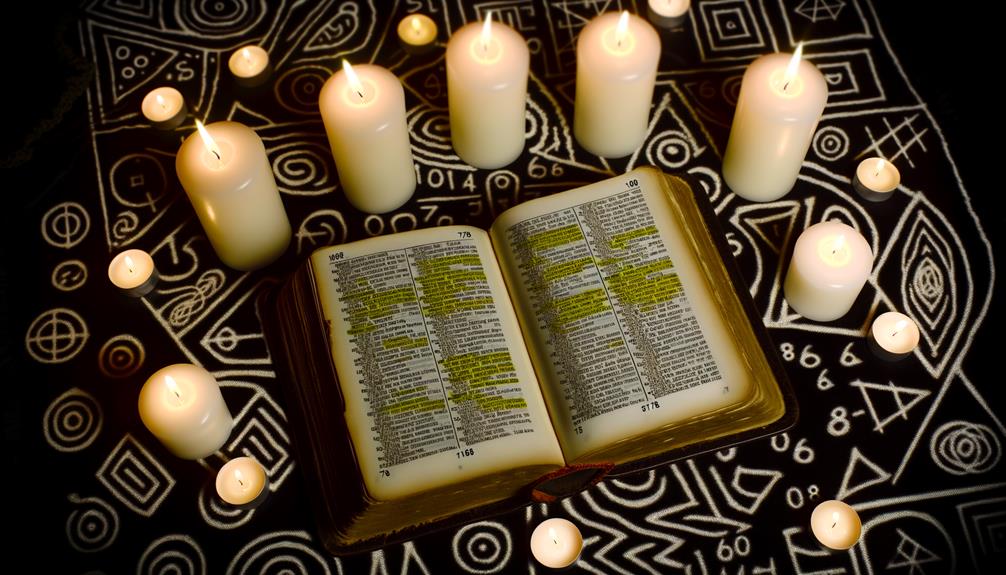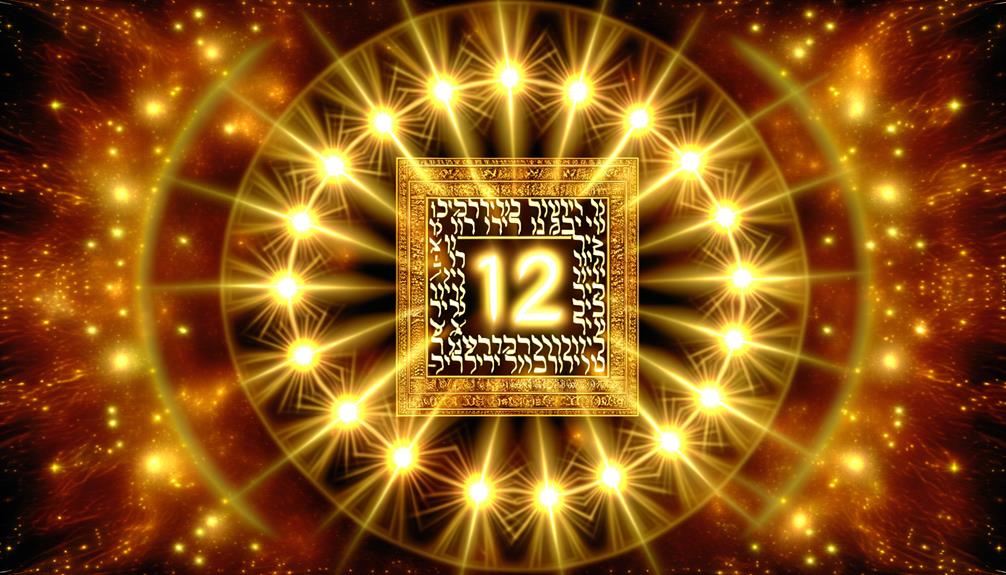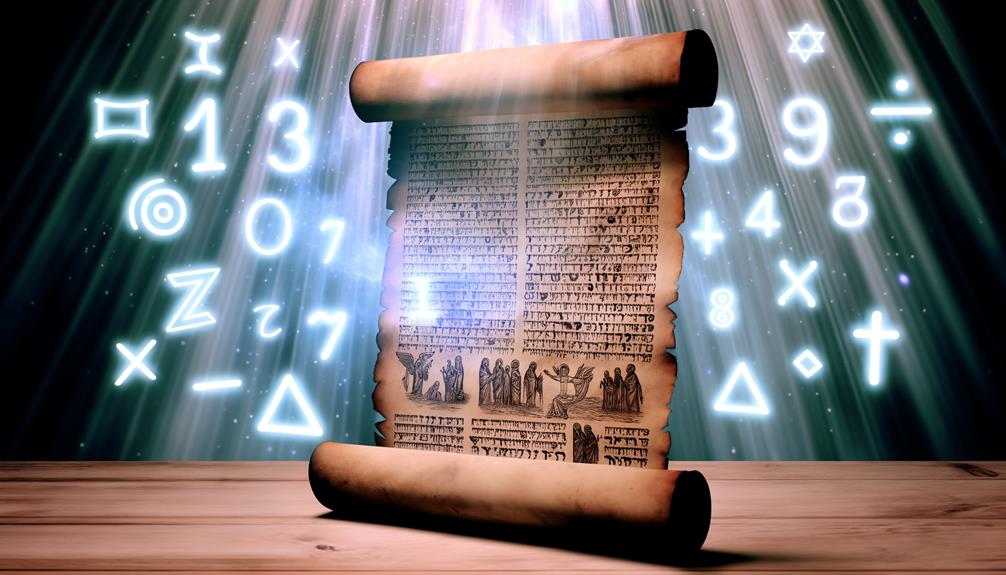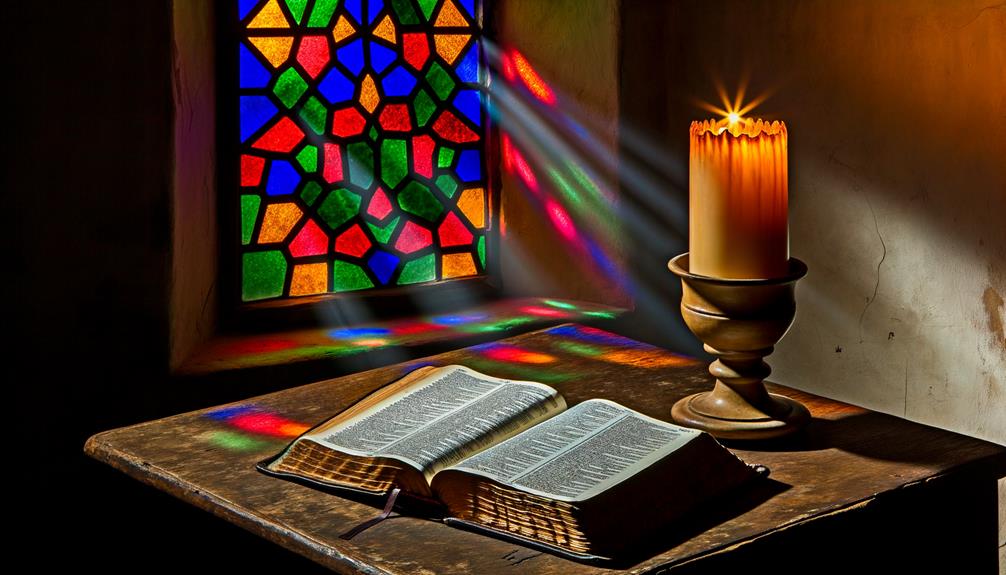108 Meaning in the Bible: Unveiling the Spiritual Significance
In biblical numerology, the number 108 is not explicitly referenced but holds profound symbolic significance through its associations with completeness, divine governance, and cosmic order. This significance stems from its connections to other essential numbers such as 12 and 9.
Twelve signifies divine governance, as seen in the twelve tribes of Israel, while nine represents divine completeness and finality. The intersection of these values in 108 opens a deeper understanding of spiritual and theological dimensions within the biblical context.
Exploring these connections further illuminates the intricate ways numbers convey divine principles and eternal truths in scripture.

Key Takeaways
- The number 108 symbolizes spiritual completeness and cosmic order, reflecting divine principles across various religious traditions.
- As a multiple of 9, 108 signifies divine completeness and finality in biblical contexts.
- The synthesis of 108 incorporates the number 12, representing divine governance and wholeness, seen in the tribes of Israel and apostles.
- Biblical numerology interprets 108 as an intricate relationship between numbers, revealing deeper theological messages.
108 Meaning in the Bible: Uncover the Spiritual Significance
| Aspect | Details |
|---|---|
| Numerology and Biblical Meaning | 108 isn’t directly referenced in the Bible, but it can be interpreted through symbolic meanings of numbers 1, 0, and 8. |
| Symbolism of Number 1 | Represents unity, God’s oneness, and the beginning of creation (Genesis 1:1). |
| Symbolism of Number 0 | Zero can symbolize the infinite nature of God, eternal life, and completeness. |
| Symbolism of Number 8 | The number 8 often represents new beginnings, resurrection, and salvation (as in the resurrection of Jesus on the eighth day). |
| Combined Spiritual Meaning | 108 can be interpreted as God’s unity and completeness bringing forth new beginnings and eternal life. |
| Related Scriptures | Genesis 1:1 (unity of God), Revelation 21:5 (new beginnings), John 11:25 (resurrection and life). |
| Cultural Influence | In some Christian traditions, the number 108 is associated with wholeness and spiritual practice, often in prayer or meditation. |
| Application in Faith | Can symbolize the call to embrace God’s completeness and the promise of eternal life through Christ. |
| Possible Symbolic Use | The number 108 could inspire themes of unity, wholeness, and the resurrection in Christian teachings. |
Symbolic Numbers in Scripture

Throughout biblical scholarship, numbers are frequently regarded as possessing deep symbolic significance, often reflecting theological and spiritual truths.
This symbolic numerology is evident across various texts, where numbers like three, seven, and forty recurrently appear with distinct meanings.
For instance, the number three often symbolizes completeness or divine perfection, seen in the Holy Trinity.
The number seven signifies wholeness or divine perfection, as illustrated by the seven days of creation.
Similarly, the number forty typically represents periods of testing or transformation, such as the forty days of Jesus’ temptation in the wilderness. The symbolic meaning of 40 can also be found in the story of Noah and the forty days and nights of rain that resulted in the Great Flood. In both instances, the number forty represents a significant period of trial and purification. Throughout various religious and cultural traditions, the symbolic meaning of 40 often signifies a time of transition or preparation for a new phase in one’s journey.
Analyzing these numbers offers profound insights into biblical narratives, enabling a deeper understanding of the theological messages conveyed through these divinely inspired texts.
The Number 108 in Religion

The number 108 holds a multifaceted symbolic significance across various religious traditions, suggesting a universal resonance beyond its biblical context.
Examining its role in Hinduism, Buddhism, and other spiritual systems provides a comparative framework that enriches our understanding of its theological import.
This exploration highlights the interconnectedness of numerical symbolism, offering deeper insights into its spiritual and cultural dimensions.
Symbolic Significance Overview
In various religious traditions, the number 108 emerges as a symbol of cosmic order and spiritual completeness. This numeral’s significance spans multiple faiths, encapsulating the essence of the cosmos and human existence.
Numerologically, 108 is seen to encapsulate the wholeness of existence, often linked with the divine and the infinite. Theologically, it resonates with principles of completeness and unity, embodying ideas of totality in religious cosmology.
It serves as a bridge between the microcosm and macrocosm, illustrating the interconnectedness of individual spiritual journeys with the larger universe. This symbolic resonance is not limited to abstract thought; it permeates religious practices, guiding rituals and meditations.
Thereby, it reinforces its profound spiritual and cosmic significance across various traditions.
Comparative Religious Contexts
Examining the presence of the number 108 across various religious contexts reveals its pervasive role in symbolizing spiritual and cosmic principles.
In Hinduism, 108 is sacred, encapsulating the universe’s wholeness, often reflected in the 108 beads of a mala for meditation.
Buddhism similarly reveres this number, seen in the 108 earthly temptations one must overcome to achieve enlightenment.
In Jainism, 108 denotes the 108 virtues essential for spiritual purity.
Although less pronounced in Abrahamic traditions, parallels can be drawn in Kabbalistic numerology within Judaism, which attributes mystical significance to numbers.
Such cross-religious reverence underscores the universal quest for divine connection, suggesting a shared spiritual architecture that transcends doctrinal boundaries.
Biblical Numerology Basics

Biblical numerology, a subfield of theology that interprets numbers within scripture, seeks to uncover deeper spiritual truths and divine principles through numerical symbolism.
Scholars in this field analyze specific numbers that recur throughout the biblical texts, proposing that these numbers hold significant meaning beyond their literal value.
For instance, numbers such as 3, 7, and 40 frequently appear and are often attributed with symbolic meanings reflecting completeness, perfection, or periods of trial, respectively.
The study of biblical numerology involves meticulous exegesis, taking into account historical, cultural, and literary contexts to elucidate the intended divine messages.
This scholarly pursuit aims to enhance our understanding of the theological and spiritual dimensions embedded within the numerical patterns of sacred scripture.
Connections to Number 12

The number 108 holds indirect yet compelling ties to the number 12, a figure that is pivotal in biblical numerology, symbolizing completeness and divine governance.
This connection is evident through the twelve tribes of Israel, representing the foundation of God’s chosen people, and the twelve apostles, who signify the dissemination of Christ’s teachings.
Exploring these connections reveals a deeper understanding of the theological implications and symbolic resonance within the biblical text.
Twelve Tribes Significance
The significance of the number 12 in relation to the Twelve Tribes of Israel extends beyond its practical enumeration, symbolizing divine order, governance, and completeness within biblical theology.
Each tribe, descending from the twelve sons of Jacob, embodies a distinct facet of Israel’s collective identity and covenantal relationship with God.
The number 12 frequently appears in scripture to denote wholeness and divine authority, underscoring the tribes’ integral role in the sacred narrative.
This numerological symbolism is evident in structures like the priestly breastplate, which features twelve stones representing the tribes.
Consequently, the number 12 serves as a theological anchor, reinforcing the concept of God’s ordained structure and the unity of His chosen people within the biblical tradition.
Apostles and Disciples
In the New Scripture, the selection of twelve apostles by Jesus underscores the continuation and fulfillment of the Old Scripture‘s symbolic use of the number 12, reflecting divine governance and the establishment of a new covenant community.
This numerological continuity signifies a deliberate theological bridge between the Twelve Tribes of Israel and the nascent Church, symbolizing completeness and divine order.
Jesus’ choice of twelve apostles echoes Israel’s foundational structure, consequently asserting a new ecclesiastical paradigm rooted in historical continuity.
Each apostle embodies a pillar of the new faith, tasked with disseminating Jesus’ teachings and reinforcing the unity and universality of the early Christian community.
Hence, the number twelve emerges as a profound theological motif, encapsulating the shift from Old to New Covenant.
Significance of Number 9

Within biblical numerology, the number 9 often symbolizes divine completeness and finality, as evidenced by its frequent association with judgment and the fruits of the Holy Spirit.
Theologically, the number 9 is seen in the nine fruits of the Holy Spirit enumerated in Galatians 5:22-23, representing the culmination of a spiritually mature life.
Additionally, the Day of Atonement, Yom Kippur, is observed on the ninth day of the seventh month, underscoring the finality of judgment and atonement in Jewish tradition.
The number 9 also appears in the context of Jesus’ crucifixion, occurring at the ninth hour, signifying the completion of His redemptive work.
Hence, the number 9 encapsulates a profound sense of spiritual fulfillment and divine resolution.
Multiples and Meanings

Exploring the multiples of significant biblical numbers, such as 108, reveals deeper layers of symbolic meaning and theological insight.
The number 108, a multiple of 9, can be viewed through its division into 12 sets of 9, linking it to both completeness and divine order.
In biblical numerology, the number 12 signifies governance and apostolic foundation, while 9 often represents finality and divine completeness.
Consequently, 108, amalgamating these elements, might be interpreted as the fullness of divine governance and completion.
Theologically, this synthesis of numerological meanings invites an enriched understanding of scriptural texts, suggesting an inherent structure and interconnectedness that transcends mere arithmetic, reflecting divine intentionality in the biblical narrative.
Spiritual Interpretations

Spiritual interpretations of the number 108 in the Bible reveal layers of meaning that highlight the intricate relationship between numbers and divine principles.
In biblical numerology, numbers often serve as symbols reflecting God’s nature and His interaction with humanity. The number 108, though not directly cited in the canonical texts, can be explored through its factors and multiples, drawing connections to more prevalent biblical numerics such as 12 and 9, each bearing theological significance.
For instance, the number 12 symbolizes divine authority and perfection, while 9 represents divine completeness. By examining these associations, scholars can infer the spiritual resonance of 108, proposing that it encapsulates a synthesis of divine order and completeness, enriching our understanding of biblical numerology.
Theological Perspectives

Analyzing the theological perspectives on the number 108 requires a deep examination of its symbolic connections and the broader biblical framework in which it might be implicitly referenced. While the number 108 is not explicitly mentioned in the Bible, theological scholars often explore numeric symbolism through:
- Biblical Numerology: Understanding how numbers like 7, 12, and 40 are used symbolically.
- Typology: Examining patterns and types that prefigure Christ and salvation.
- Extra-Biblical Texts: Considering how numbers are interpreted in Jewish and early Christian writings.
This exploration necessitates a nuanced understanding of ancient contexts and theological traditions, guiding scholars in uncovering deeper biblical meanings.
Modern Biblical Analysis

Building on the theological perspectives, modern biblical analysis employs contemporary exegetical methods to investigate the potential significance of the number 108 within scriptural and historical contexts.
Scholars utilize textual criticism, intertextual analysis, and historical-critical methods to discern patterns and symbolic meanings. Although the number 108 does not appear overtly in canonical biblical texts, its occurrence in ancient numerological traditions and other religious contexts prompts a deeper examination.
Researchers consider the influence of numerology on Jewish and early Christian thought, exploring how such numerics might metaphorically or theologically enrich biblical narratives.
This interdisciplinary approach, integrating historical data and theological discourse, seeks to uncover underlying connections that might otherwise remain obscured, thereby contributing to a more nuanced understanding of biblical numerology.
Conclusion
In the labyrinth of biblical numerology, the number 108 emerges as a confluence of significant scriptural elements, much like the intricate weaving of a sacred tapestry.
With roots entwined in the symbolism of numbers 12 and 9, 108 serves as a vessel for profound theological insights.
Just as a single thread can unify and enhance the complexity of a tapestry, the number 108 intricately connects various biblical themes, enriching the spiritual and scholarly understanding of scripture.






